The Impact of Brexit on UK Business: A Detailed Report
VerifiedAdded on 2023/01/11
|8
|2534
|74
Report
AI Summary
This report investigates the impact of Brexit on UK businesses, focusing on the research methodology employed to gather and analyze relevant data. It explores various types of investigations, including qualitative and quantitative approaches, and delves into research philosophies such as positivism and interpretivism. The report also examines the use of deductive and inductive research approaches, along with descriptive research designs, to understand the effect of Brexit on the UK economy. It details the data collection methods, including primary and secondary sources, and how these methods contribute to drawing valid conclusions. The study aims to provide an in-depth analysis of Brexit's effects, evaluating both the positive and negative consequences for UK companies and the broader economic landscape. The report covers the methodology used for data gathering and analysis, and the findings are based on secondary data collection methods, providing a comprehensive overview of the subject.

The impact of Brexit
on U.K business
on U.K business
Paraphrase This Document
Need a fresh take? Get an instant paraphrase of this document with our AI Paraphraser

Contents
RESEARCH METHDOLOGY..........................................................................................................3
Types of investigation.......................................................................................................................3
Research philosophy..........................................................................................................................4
REFERENCES....................................................................................................................................8
RESEARCH METHDOLOGY..........................................................................................................3
Types of investigation.......................................................................................................................3
Research philosophy..........................................................................................................................4
REFERENCES....................................................................................................................................8
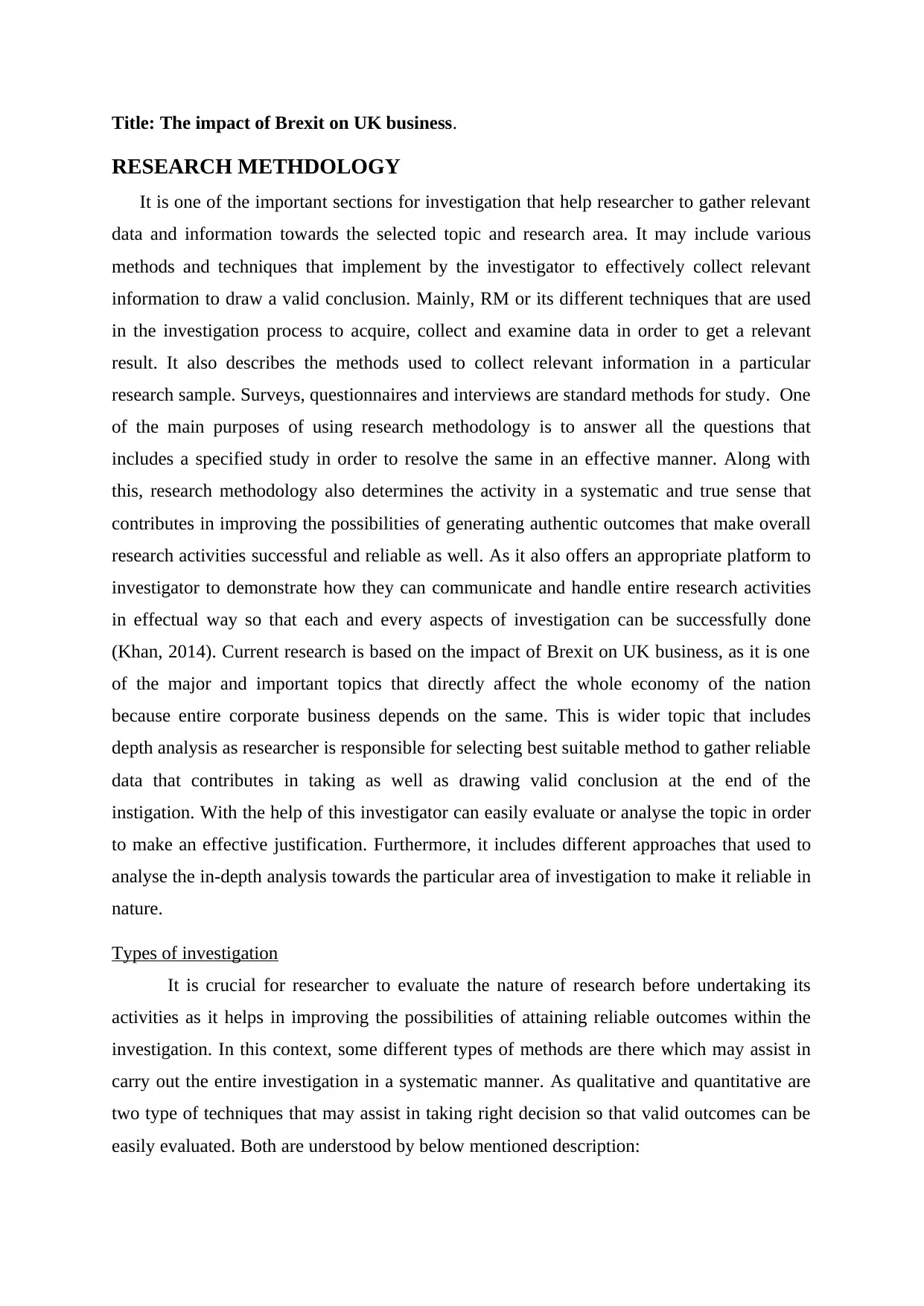
Title: The impact of Brexit on UK business.
RESEARCH METHDOLOGY
It is one of the important sections for investigation that help researcher to gather relevant
data and information towards the selected topic and research area. It may include various
methods and techniques that implement by the investigator to effectively collect relevant
information to draw a valid conclusion. Mainly, RM or its different techniques that are used
in the investigation process to acquire, collect and examine data in order to get a relevant
result. It also describes the methods used to collect relevant information in a particular
research sample. Surveys, questionnaires and interviews are standard methods for study. One
of the main purposes of using research methodology is to answer all the questions that
includes a specified study in order to resolve the same in an effective manner. Along with
this, research methodology also determines the activity in a systematic and true sense that
contributes in improving the possibilities of generating authentic outcomes that make overall
research activities successful and reliable as well. As it also offers an appropriate platform to
investigator to demonstrate how they can communicate and handle entire research activities
in effectual way so that each and every aspects of investigation can be successfully done
(Khan, 2014). Current research is based on the impact of Brexit on UK business, as it is one
of the major and important topics that directly affect the whole economy of the nation
because entire corporate business depends on the same. This is wider topic that includes
depth analysis as researcher is responsible for selecting best suitable method to gather reliable
data that contributes in taking as well as drawing valid conclusion at the end of the
instigation. With the help of this investigator can easily evaluate or analyse the topic in order
to make an effective justification. Furthermore, it includes different approaches that used to
analyse the in-depth analysis towards the particular area of investigation to make it reliable in
nature.
Types of investigation
It is crucial for researcher to evaluate the nature of research before undertaking its
activities as it helps in improving the possibilities of attaining reliable outcomes within the
investigation. In this context, some different types of methods are there which may assist in
carry out the entire investigation in a systematic manner. As qualitative and quantitative are
two type of techniques that may assist in taking right decision so that valid outcomes can be
easily evaluated. Both are understood by below mentioned description:
RESEARCH METHDOLOGY
It is one of the important sections for investigation that help researcher to gather relevant
data and information towards the selected topic and research area. It may include various
methods and techniques that implement by the investigator to effectively collect relevant
information to draw a valid conclusion. Mainly, RM or its different techniques that are used
in the investigation process to acquire, collect and examine data in order to get a relevant
result. It also describes the methods used to collect relevant information in a particular
research sample. Surveys, questionnaires and interviews are standard methods for study. One
of the main purposes of using research methodology is to answer all the questions that
includes a specified study in order to resolve the same in an effective manner. Along with
this, research methodology also determines the activity in a systematic and true sense that
contributes in improving the possibilities of generating authentic outcomes that make overall
research activities successful and reliable as well. As it also offers an appropriate platform to
investigator to demonstrate how they can communicate and handle entire research activities
in effectual way so that each and every aspects of investigation can be successfully done
(Khan, 2014). Current research is based on the impact of Brexit on UK business, as it is one
of the major and important topics that directly affect the whole economy of the nation
because entire corporate business depends on the same. This is wider topic that includes
depth analysis as researcher is responsible for selecting best suitable method to gather reliable
data that contributes in taking as well as drawing valid conclusion at the end of the
instigation. With the help of this investigator can easily evaluate or analyse the topic in order
to make an effective justification. Furthermore, it includes different approaches that used to
analyse the in-depth analysis towards the particular area of investigation to make it reliable in
nature.
Types of investigation
It is crucial for researcher to evaluate the nature of research before undertaking its
activities as it helps in improving the possibilities of attaining reliable outcomes within the
investigation. In this context, some different types of methods are there which may assist in
carry out the entire investigation in a systematic manner. As qualitative and quantitative are
two type of techniques that may assist in taking right decision so that valid outcomes can be
easily evaluated. Both are understood by below mentioned description:
⊘ This is a preview!⊘
Do you want full access?
Subscribe today to unlock all pages.

Trusted by 1+ million students worldwide
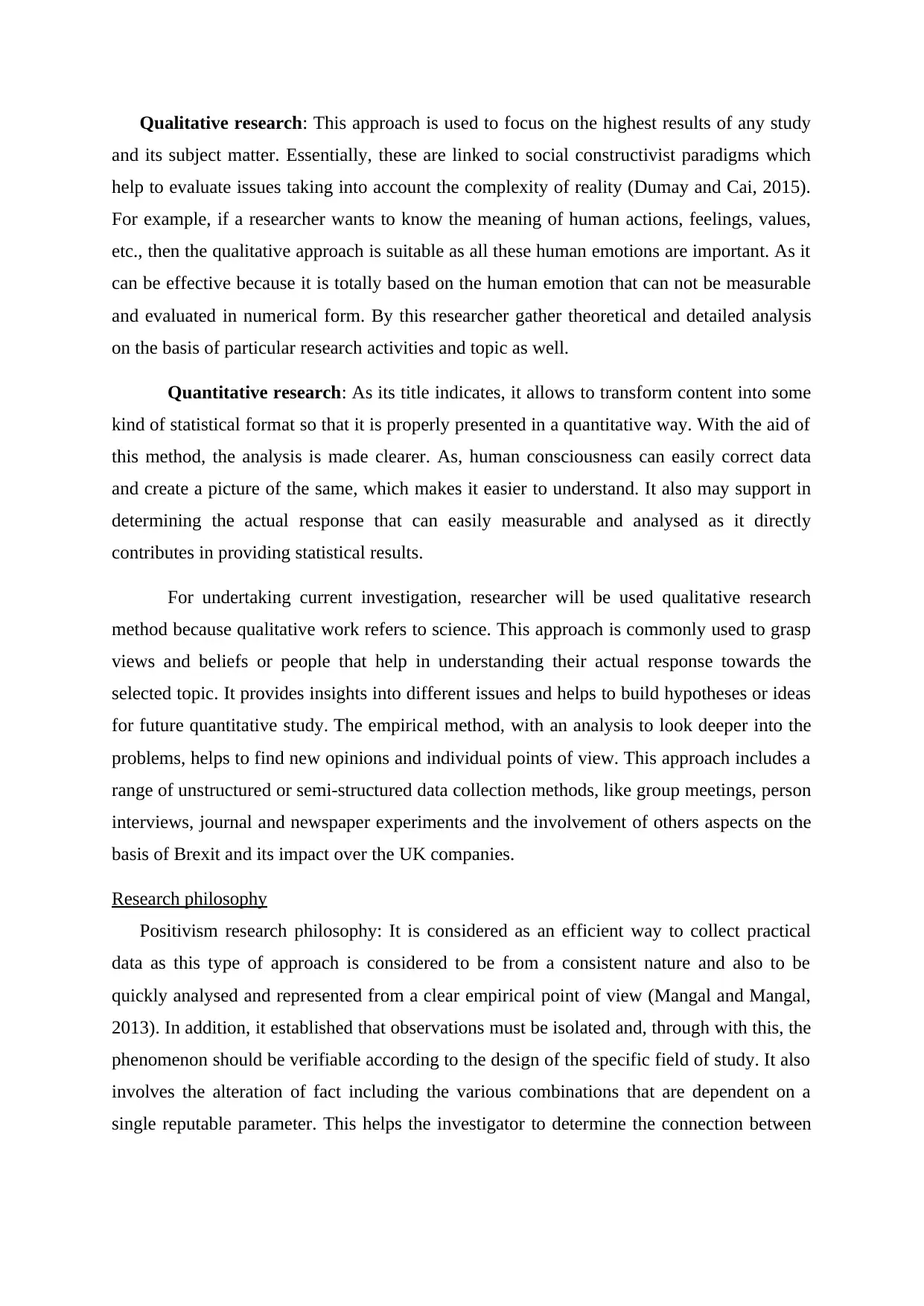
Qualitative research: This approach is used to focus on the highest results of any study
and its subject matter. Essentially, these are linked to social constructivist paradigms which
help to evaluate issues taking into account the complexity of reality (Dumay and Cai, 2015).
For example, if a researcher wants to know the meaning of human actions, feelings, values,
etc., then the qualitative approach is suitable as all these human emotions are important. As it
can be effective because it is totally based on the human emotion that can not be measurable
and evaluated in numerical form. By this researcher gather theoretical and detailed analysis
on the basis of particular research activities and topic as well.
Quantitative research: As its title indicates, it allows to transform content into some
kind of statistical format so that it is properly presented in a quantitative way. With the aid of
this method, the analysis is made clearer. As, human consciousness can easily correct data
and create a picture of the same, which makes it easier to understand. It also may support in
determining the actual response that can easily measurable and analysed as it directly
contributes in providing statistical results.
For undertaking current investigation, researcher will be used qualitative research
method because qualitative work refers to science. This approach is commonly used to grasp
views and beliefs or people that help in understanding their actual response towards the
selected topic. It provides insights into different issues and helps to build hypotheses or ideas
for future quantitative study. The empirical method, with an analysis to look deeper into the
problems, helps to find new opinions and individual points of view. This approach includes a
range of unstructured or semi-structured data collection methods, like group meetings, person
interviews, journal and newspaper experiments and the involvement of others aspects on the
basis of Brexit and its impact over the UK companies.
Research philosophy
Positivism research philosophy: It is considered as an efficient way to collect practical
data as this type of approach is considered to be from a consistent nature and also to be
quickly analysed and represented from a clear empirical point of view (Mangal and Mangal,
2013). In addition, it established that observations must be isolated and, through with this, the
phenomenon should be verifiable according to the design of the specific field of study. It also
involves the alteration of fact including the various combinations that are dependent on a
single reputable parameter. This helps the investigator to determine the connection between
and its subject matter. Essentially, these are linked to social constructivist paradigms which
help to evaluate issues taking into account the complexity of reality (Dumay and Cai, 2015).
For example, if a researcher wants to know the meaning of human actions, feelings, values,
etc., then the qualitative approach is suitable as all these human emotions are important. As it
can be effective because it is totally based on the human emotion that can not be measurable
and evaluated in numerical form. By this researcher gather theoretical and detailed analysis
on the basis of particular research activities and topic as well.
Quantitative research: As its title indicates, it allows to transform content into some
kind of statistical format so that it is properly presented in a quantitative way. With the aid of
this method, the analysis is made clearer. As, human consciousness can easily correct data
and create a picture of the same, which makes it easier to understand. It also may support in
determining the actual response that can easily measurable and analysed as it directly
contributes in providing statistical results.
For undertaking current investigation, researcher will be used qualitative research
method because qualitative work refers to science. This approach is commonly used to grasp
views and beliefs or people that help in understanding their actual response towards the
selected topic. It provides insights into different issues and helps to build hypotheses or ideas
for future quantitative study. The empirical method, with an analysis to look deeper into the
problems, helps to find new opinions and individual points of view. This approach includes a
range of unstructured or semi-structured data collection methods, like group meetings, person
interviews, journal and newspaper experiments and the involvement of others aspects on the
basis of Brexit and its impact over the UK companies.
Research philosophy
Positivism research philosophy: It is considered as an efficient way to collect practical
data as this type of approach is considered to be from a consistent nature and also to be
quickly analysed and represented from a clear empirical point of view (Mangal and Mangal,
2013). In addition, it established that observations must be isolated and, through with this, the
phenomenon should be verifiable according to the design of the specific field of study. It also
involves the alteration of fact including the various combinations that are dependent on a
single reputable parameter. This helps the investigator to determine the connection between
Paraphrase This Document
Need a fresh take? Get an instant paraphrase of this document with our AI Paraphraser
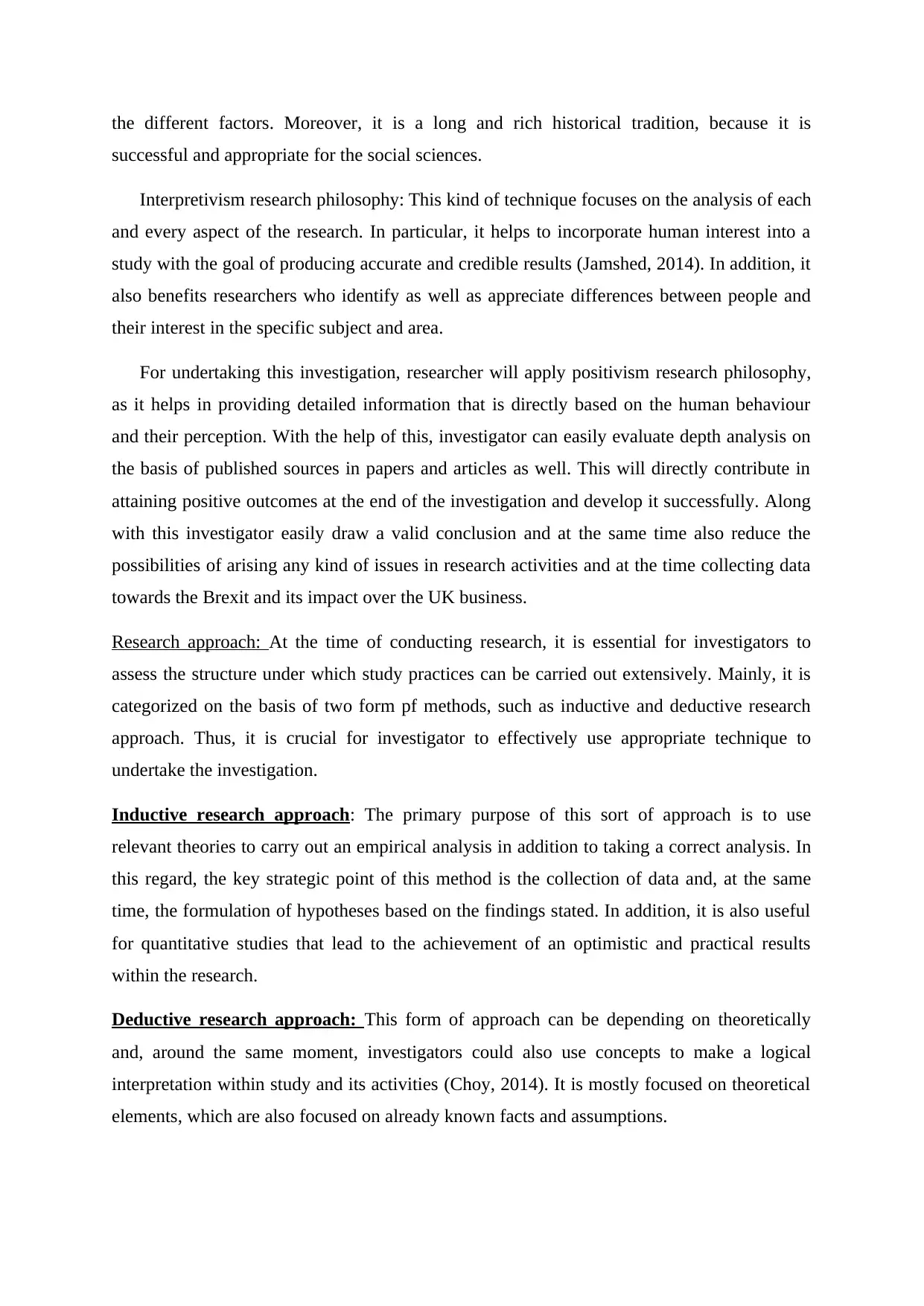
the different factors. Moreover, it is a long and rich historical tradition, because it is
successful and appropriate for the social sciences.
Interpretivism research philosophy: This kind of technique focuses on the analysis of each
and every aspect of the research. In particular, it helps to incorporate human interest into a
study with the goal of producing accurate and credible results (Jamshed, 2014). In addition, it
also benefits researchers who identify as well as appreciate differences between people and
their interest in the specific subject and area.
For undertaking this investigation, researcher will apply positivism research philosophy,
as it helps in providing detailed information that is directly based on the human behaviour
and their perception. With the help of this, investigator can easily evaluate depth analysis on
the basis of published sources in papers and articles as well. This will directly contribute in
attaining positive outcomes at the end of the investigation and develop it successfully. Along
with this investigator easily draw a valid conclusion and at the same time also reduce the
possibilities of arising any kind of issues in research activities and at the time collecting data
towards the Brexit and its impact over the UK business.
Research approach: At the time of conducting research, it is essential for investigators to
assess the structure under which study practices can be carried out extensively. Mainly, it is
categorized on the basis of two form pf methods, such as inductive and deductive research
approach. Thus, it is crucial for investigator to effectively use appropriate technique to
undertake the investigation.
Inductive research approach: The primary purpose of this sort of approach is to use
relevant theories to carry out an empirical analysis in addition to taking a correct analysis. In
this regard, the key strategic point of this method is the collection of data and, at the same
time, the formulation of hypotheses based on the findings stated. In addition, it is also useful
for quantitative studies that lead to the achievement of an optimistic and practical results
within the research.
Deductive research approach: This form of approach can be depending on theoretically
and, around the same moment, investigators could also use concepts to make a logical
interpretation within study and its activities (Choy, 2014). It is mostly focused on theoretical
elements, which are also focused on already known facts and assumptions.
successful and appropriate for the social sciences.
Interpretivism research philosophy: This kind of technique focuses on the analysis of each
and every aspect of the research. In particular, it helps to incorporate human interest into a
study with the goal of producing accurate and credible results (Jamshed, 2014). In addition, it
also benefits researchers who identify as well as appreciate differences between people and
their interest in the specific subject and area.
For undertaking this investigation, researcher will apply positivism research philosophy,
as it helps in providing detailed information that is directly based on the human behaviour
and their perception. With the help of this, investigator can easily evaluate depth analysis on
the basis of published sources in papers and articles as well. This will directly contribute in
attaining positive outcomes at the end of the investigation and develop it successfully. Along
with this investigator easily draw a valid conclusion and at the same time also reduce the
possibilities of arising any kind of issues in research activities and at the time collecting data
towards the Brexit and its impact over the UK business.
Research approach: At the time of conducting research, it is essential for investigators to
assess the structure under which study practices can be carried out extensively. Mainly, it is
categorized on the basis of two form pf methods, such as inductive and deductive research
approach. Thus, it is crucial for investigator to effectively use appropriate technique to
undertake the investigation.
Inductive research approach: The primary purpose of this sort of approach is to use
relevant theories to carry out an empirical analysis in addition to taking a correct analysis. In
this regard, the key strategic point of this method is the collection of data and, at the same
time, the formulation of hypotheses based on the findings stated. In addition, it is also useful
for quantitative studies that lead to the achievement of an optimistic and practical results
within the research.
Deductive research approach: This form of approach can be depending on theoretically
and, around the same moment, investigators could also use concepts to make a logical
interpretation within study and its activities (Choy, 2014). It is mostly focused on theoretical
elements, which are also focused on already known facts and assumptions.
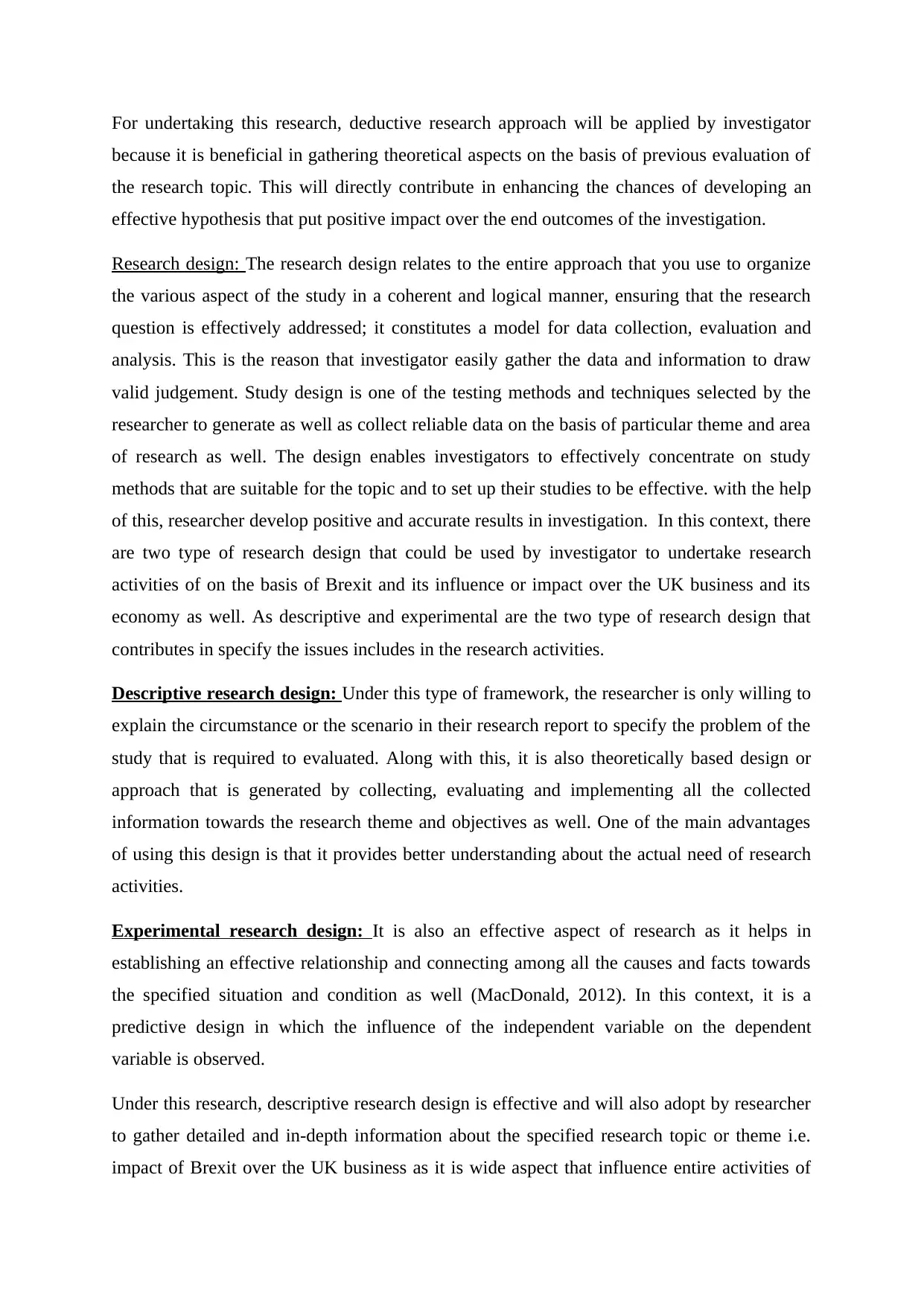
For undertaking this research, deductive research approach will be applied by investigator
because it is beneficial in gathering theoretical aspects on the basis of previous evaluation of
the research topic. This will directly contribute in enhancing the chances of developing an
effective hypothesis that put positive impact over the end outcomes of the investigation.
Research design: The research design relates to the entire approach that you use to organize
the various aspect of the study in a coherent and logical manner, ensuring that the research
question is effectively addressed; it constitutes a model for data collection, evaluation and
analysis. This is the reason that investigator easily gather the data and information to draw
valid judgement. Study design is one of the testing methods and techniques selected by the
researcher to generate as well as collect reliable data on the basis of particular theme and area
of research as well. The design enables investigators to effectively concentrate on study
methods that are suitable for the topic and to set up their studies to be effective. with the help
of this, researcher develop positive and accurate results in investigation. In this context, there
are two type of research design that could be used by investigator to undertake research
activities of on the basis of Brexit and its influence or impact over the UK business and its
economy as well. As descriptive and experimental are the two type of research design that
contributes in specify the issues includes in the research activities.
Descriptive research design: Under this type of framework, the researcher is only willing to
explain the circumstance or the scenario in their research report to specify the problem of the
study that is required to evaluated. Along with this, it is also theoretically based design or
approach that is generated by collecting, evaluating and implementing all the collected
information towards the research theme and objectives as well. One of the main advantages
of using this design is that it provides better understanding about the actual need of research
activities.
Experimental research design: It is also an effective aspect of research as it helps in
establishing an effective relationship and connecting among all the causes and facts towards
the specified situation and condition as well (MacDonald, 2012). In this context, it is a
predictive design in which the influence of the independent variable on the dependent
variable is observed.
Under this research, descriptive research design is effective and will also adopt by researcher
to gather detailed and in-depth information about the specified research topic or theme i.e.
impact of Brexit over the UK business as it is wide aspect that influence entire activities of
because it is beneficial in gathering theoretical aspects on the basis of previous evaluation of
the research topic. This will directly contribute in enhancing the chances of developing an
effective hypothesis that put positive impact over the end outcomes of the investigation.
Research design: The research design relates to the entire approach that you use to organize
the various aspect of the study in a coherent and logical manner, ensuring that the research
question is effectively addressed; it constitutes a model for data collection, evaluation and
analysis. This is the reason that investigator easily gather the data and information to draw
valid judgement. Study design is one of the testing methods and techniques selected by the
researcher to generate as well as collect reliable data on the basis of particular theme and area
of research as well. The design enables investigators to effectively concentrate on study
methods that are suitable for the topic and to set up their studies to be effective. with the help
of this, researcher develop positive and accurate results in investigation. In this context, there
are two type of research design that could be used by investigator to undertake research
activities of on the basis of Brexit and its influence or impact over the UK business and its
economy as well. As descriptive and experimental are the two type of research design that
contributes in specify the issues includes in the research activities.
Descriptive research design: Under this type of framework, the researcher is only willing to
explain the circumstance or the scenario in their research report to specify the problem of the
study that is required to evaluated. Along with this, it is also theoretically based design or
approach that is generated by collecting, evaluating and implementing all the collected
information towards the research theme and objectives as well. One of the main advantages
of using this design is that it provides better understanding about the actual need of research
activities.
Experimental research design: It is also an effective aspect of research as it helps in
establishing an effective relationship and connecting among all the causes and facts towards
the specified situation and condition as well (MacDonald, 2012). In this context, it is a
predictive design in which the influence of the independent variable on the dependent
variable is observed.
Under this research, descriptive research design is effective and will also adopt by researcher
to gather detailed and in-depth information about the specified research topic or theme i.e.
impact of Brexit over the UK business as it is wide aspect that influence entire activities of
⊘ This is a preview!⊘
Do you want full access?
Subscribe today to unlock all pages.

Trusted by 1+ million students worldwide
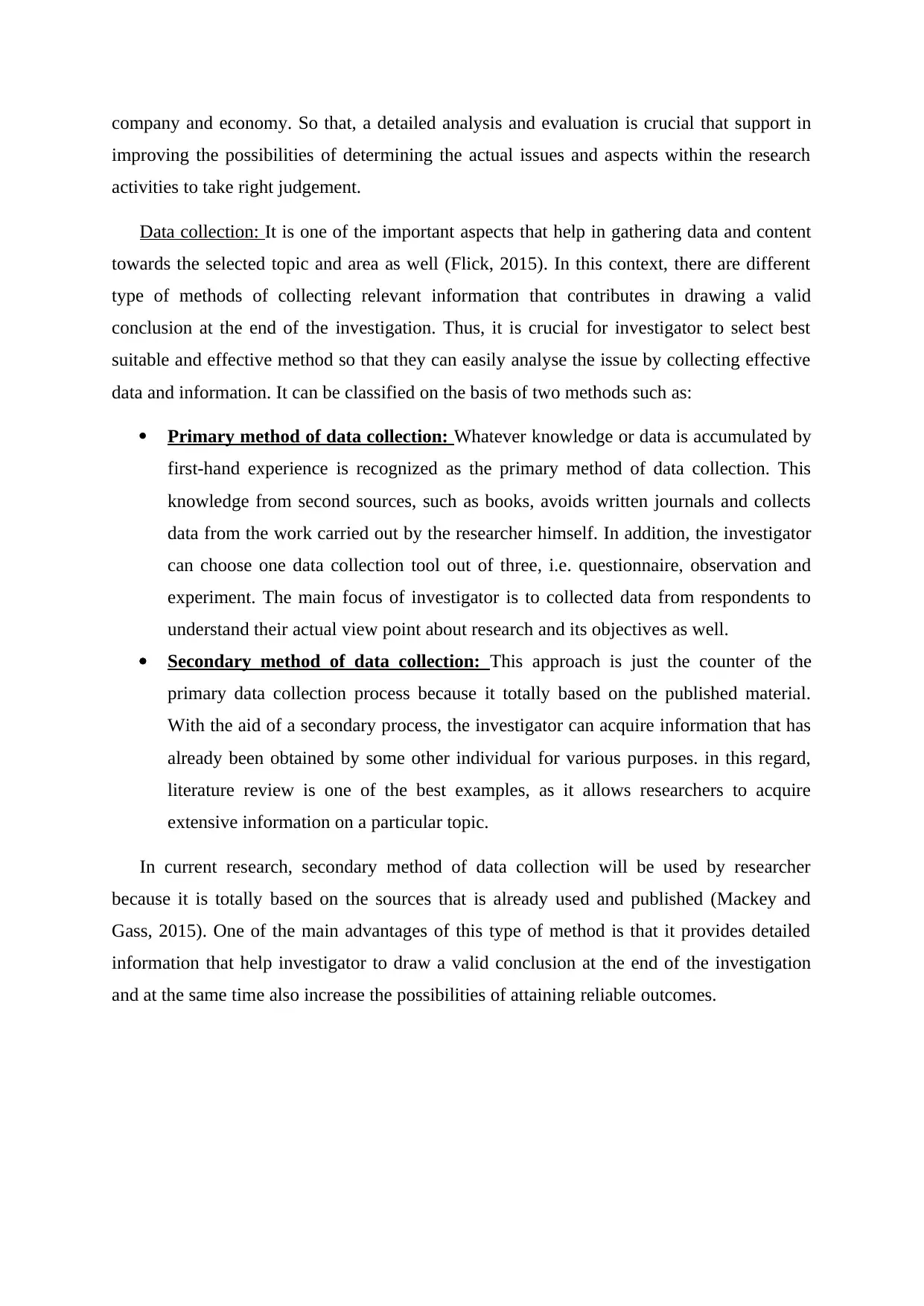
company and economy. So that, a detailed analysis and evaluation is crucial that support in
improving the possibilities of determining the actual issues and aspects within the research
activities to take right judgement.
Data collection: It is one of the important aspects that help in gathering data and content
towards the selected topic and area as well (Flick, 2015). In this context, there are different
type of methods of collecting relevant information that contributes in drawing a valid
conclusion at the end of the investigation. Thus, it is crucial for investigator to select best
suitable and effective method so that they can easily analyse the issue by collecting effective
data and information. It can be classified on the basis of two methods such as:
Primary method of data collection: Whatever knowledge or data is accumulated by
first-hand experience is recognized as the primary method of data collection. This
knowledge from second sources, such as books, avoids written journals and collects
data from the work carried out by the researcher himself. In addition, the investigator
can choose one data collection tool out of three, i.e. questionnaire, observation and
experiment. The main focus of investigator is to collected data from respondents to
understand their actual view point about research and its objectives as well.
Secondary method of data collection: This approach is just the counter of the
primary data collection process because it totally based on the published material.
With the aid of a secondary process, the investigator can acquire information that has
already been obtained by some other individual for various purposes. in this regard,
literature review is one of the best examples, as it allows researchers to acquire
extensive information on a particular topic.
In current research, secondary method of data collection will be used by researcher
because it is totally based on the sources that is already used and published (Mackey and
Gass, 2015). One of the main advantages of this type of method is that it provides detailed
information that help investigator to draw a valid conclusion at the end of the investigation
and at the same time also increase the possibilities of attaining reliable outcomes.
improving the possibilities of determining the actual issues and aspects within the research
activities to take right judgement.
Data collection: It is one of the important aspects that help in gathering data and content
towards the selected topic and area as well (Flick, 2015). In this context, there are different
type of methods of collecting relevant information that contributes in drawing a valid
conclusion at the end of the investigation. Thus, it is crucial for investigator to select best
suitable and effective method so that they can easily analyse the issue by collecting effective
data and information. It can be classified on the basis of two methods such as:
Primary method of data collection: Whatever knowledge or data is accumulated by
first-hand experience is recognized as the primary method of data collection. This
knowledge from second sources, such as books, avoids written journals and collects
data from the work carried out by the researcher himself. In addition, the investigator
can choose one data collection tool out of three, i.e. questionnaire, observation and
experiment. The main focus of investigator is to collected data from respondents to
understand their actual view point about research and its objectives as well.
Secondary method of data collection: This approach is just the counter of the
primary data collection process because it totally based on the published material.
With the aid of a secondary process, the investigator can acquire information that has
already been obtained by some other individual for various purposes. in this regard,
literature review is one of the best examples, as it allows researchers to acquire
extensive information on a particular topic.
In current research, secondary method of data collection will be used by researcher
because it is totally based on the sources that is already used and published (Mackey and
Gass, 2015). One of the main advantages of this type of method is that it provides detailed
information that help investigator to draw a valid conclusion at the end of the investigation
and at the same time also increase the possibilities of attaining reliable outcomes.
Paraphrase This Document
Need a fresh take? Get an instant paraphrase of this document with our AI Paraphraser
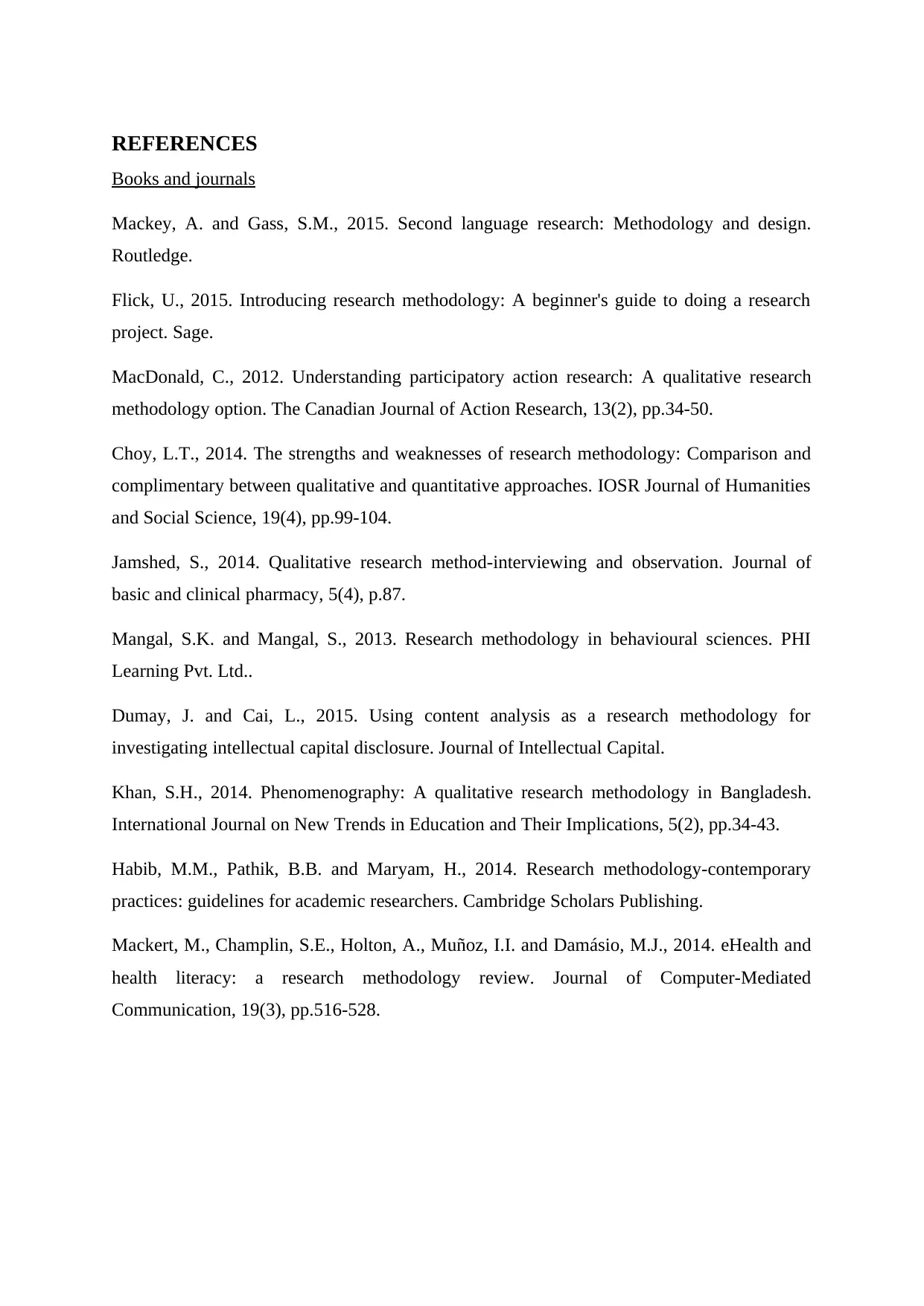
REFERENCES
Books and journals
Mackey, A. and Gass, S.M., 2015. Second language research: Methodology and design.
Routledge.
Flick, U., 2015. Introducing research methodology: A beginner's guide to doing a research
project. Sage.
MacDonald, C., 2012. Understanding participatory action research: A qualitative research
methodology option. The Canadian Journal of Action Research, 13(2), pp.34-50.
Choy, L.T., 2014. The strengths and weaknesses of research methodology: Comparison and
complimentary between qualitative and quantitative approaches. IOSR Journal of Humanities
and Social Science, 19(4), pp.99-104.
Jamshed, S., 2014. Qualitative research method-interviewing and observation. Journal of
basic and clinical pharmacy, 5(4), p.87.
Mangal, S.K. and Mangal, S., 2013. Research methodology in behavioural sciences. PHI
Learning Pvt. Ltd..
Dumay, J. and Cai, L., 2015. Using content analysis as a research methodology for
investigating intellectual capital disclosure. Journal of Intellectual Capital.
Khan, S.H., 2014. Phenomenography: A qualitative research methodology in Bangladesh.
International Journal on New Trends in Education and Their Implications, 5(2), pp.34-43.
Habib, M.M., Pathik, B.B. and Maryam, H., 2014. Research methodology-contemporary
practices: guidelines for academic researchers. Cambridge Scholars Publishing.
Mackert, M., Champlin, S.E., Holton, A., Muñoz, I.I. and Damásio, M.J., 2014. eHealth and
health literacy: a research methodology review. Journal of Computer-Mediated
Communication, 19(3), pp.516-528.
Books and journals
Mackey, A. and Gass, S.M., 2015. Second language research: Methodology and design.
Routledge.
Flick, U., 2015. Introducing research methodology: A beginner's guide to doing a research
project. Sage.
MacDonald, C., 2012. Understanding participatory action research: A qualitative research
methodology option. The Canadian Journal of Action Research, 13(2), pp.34-50.
Choy, L.T., 2014. The strengths and weaknesses of research methodology: Comparison and
complimentary between qualitative and quantitative approaches. IOSR Journal of Humanities
and Social Science, 19(4), pp.99-104.
Jamshed, S., 2014. Qualitative research method-interviewing and observation. Journal of
basic and clinical pharmacy, 5(4), p.87.
Mangal, S.K. and Mangal, S., 2013. Research methodology in behavioural sciences. PHI
Learning Pvt. Ltd..
Dumay, J. and Cai, L., 2015. Using content analysis as a research methodology for
investigating intellectual capital disclosure. Journal of Intellectual Capital.
Khan, S.H., 2014. Phenomenography: A qualitative research methodology in Bangladesh.
International Journal on New Trends in Education and Their Implications, 5(2), pp.34-43.
Habib, M.M., Pathik, B.B. and Maryam, H., 2014. Research methodology-contemporary
practices: guidelines for academic researchers. Cambridge Scholars Publishing.
Mackert, M., Champlin, S.E., Holton, A., Muñoz, I.I. and Damásio, M.J., 2014. eHealth and
health literacy: a research methodology review. Journal of Computer-Mediated
Communication, 19(3), pp.516-528.
1 out of 8
Related Documents
Your All-in-One AI-Powered Toolkit for Academic Success.
+13062052269
info@desklib.com
Available 24*7 on WhatsApp / Email
![[object Object]](/_next/static/media/star-bottom.7253800d.svg)
Unlock your academic potential
Copyright © 2020–2026 A2Z Services. All Rights Reserved. Developed and managed by ZUCOL.





